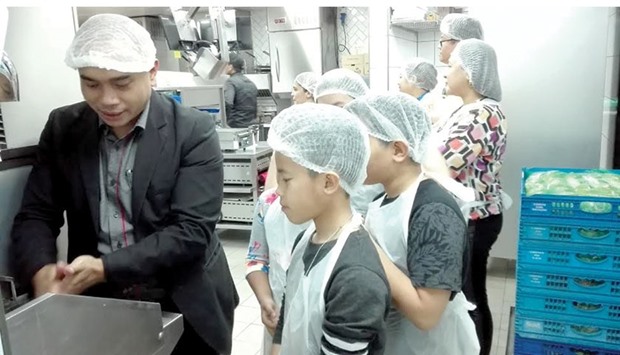
LOOK AROUND: Restaurant Manager Subhan Idris gives people a look into the Open Door Programme.
Entering the McDonald’s kitchen can be strangely relieving. With so much Internet chatter over the food served in the kitchens of the world’s largest fast food chain or how it is prepared or stored, a step-by-step tour of what really goes behind the counters is rather reassuring.
Thousands of people have visited McDonald’s kitchens since the fast food company started their Open Door programme in 2006 by inviting its customers to take a look inside and see for themselves how food is sourced, handled, prepared and served. Ten years on, the programme has helped McDonald’s interact with its customers at a personal level while offering them a first-hand experience of its hygiene, food safety, processes and procedures.
Subhan Idris, Restaurant Manager, McDonald’s City Centre 2, gave Community a quick tour of all the areas of the kitchen – the same which, as part of the Open Door Programme, McDonald’s gives to 100 customers in Qatar every month in 10 of its outlets.
The first step before entering the kitchen is of course, to wear a plastic skull cap and a plastic apron. The first task to do upon entering is to wash hands with soap and use the hand-dryer – an hourly hand-wash is compulsory for the kitchen staff and the same is monitored by the supervisor who keeps tabs.
Of all things, one might be struck by how sparkling clean and well-organised the kitchen is. A giant ice-maker makes seemingly endless cubes of ice, the chiller section has most of the food supplies neatly stocked in big shelves, packed plastic bags of burger buns lay stacked across crates, grillers and fryers stay busy and so do the ones doing the work.
“The clear, transparent one is for handling cooked food, while the blue one is for handling raw food,” says Idris, pointing to a bunch of disposable white and blue plastic gloves tucked in a corner, coloured differently so as to avoid cross contamination between different foods.
The gentlemen making burgers by the minute have everything from sauce dispensing jars to boxes of sliced vegetables and meat before them. To their right is a chart that has time slots such as two hours, or four hours; showing exactly for how long are those veggies and meat patties fit for use – any later than that and they are disposed away. Among other checks, there’s the beef integrity procedure, which using a pyrometer ensures the internal temperature of all cooked beef patties reaches 155 degrees or above and chicken patties 165 degrees or above.
The ingredients are sourced from the choicest of suppliers. The potatoes for the French fries come from Egypt, for instance. At the push of a button, giant funnels filled with hundreds of raw potato sticks promptly release a frying basket full of them, much like a cereal dispenser. “To achieve our famous crispy, juicy golden brown French fries, we fry it for three minutes,” says Idris, as he presses 3 on the device and walks away. The food is fast, after all.
All in all, the Open Door Programme has its heart in the right place. “From excited children to curious adults, we give a comprehensive tour of our kitchen to whoever wishes to take a look around,” Idris says.
The programme is part of McDonald’s Arabia’s larger plan to enhance transparency. The wildfire nature of social media that wields the power to turn even an uncorroborated hearsay into a tidal wave of public opinion through a barrage of forwards, shares, reposts, and retweets, prompted McDonald’s Arabia into launching a portal for interaction.
Last year, it kickstarted a digital platform called Your Right to Know (www.mcdonaldsarabia.com) to “offer customers a trusted source to find out exactly what’s on their tray at McDonald’s.” The idea was to nurture an open dialogue with consumers, which it has also done by displaying nutritional information in its restaurants, packaging and also on the website. One of the major healthier changes McDonald’s made to its menu, last year, was completing the transition of the frying oil used at all its restaurants in the GCC to a sunflower and canola oil blend, which promises a 37 per cent reduction in saturated fats.
Your Right to Know initiative is of considerable significance for Qatar, as well as other countries in the region. People can ask whatever bothers them about eating at McDonald’s as the firm alleviates some of the most pressing concerns of the consumers and dispels some quick-moving ‘rumours’, within 48 hours of the question being asked. Everything from what goes into their famous Chicken McNuggets to whether they sell “expired products”; the customers’ questions are met with substantiated answers.
The leading global foodservice retailer has more than 36,000 restaurants serving approximately 69 million people in more than 100 countries every day. In the GCC, McDonald’s restaurants are locally owned and operated by seven local entrepreneurs. The region’s first Mac joint came up in Riyadh, Saudi Arabia, on December 8, 1993.
